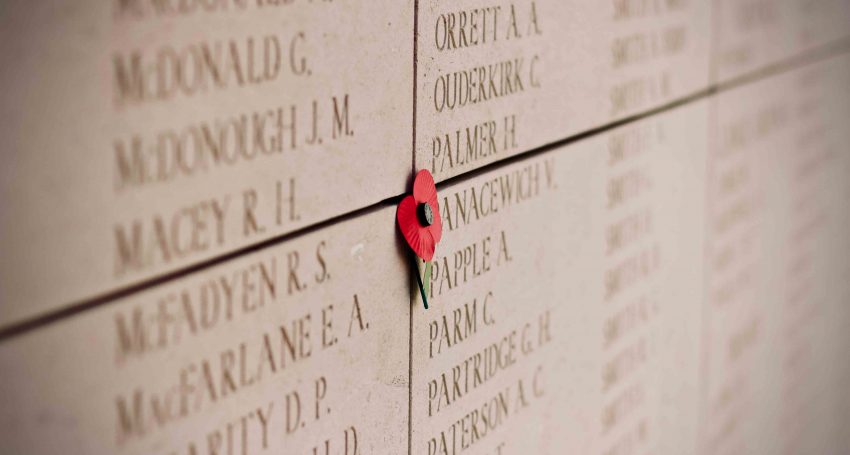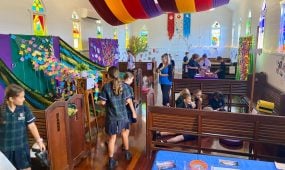The first casualty of war…
Features
The Anglican Dean of Brisbane explores World War I poetry in this thought-provoking Anzac Day reflection: “As the war went on, the poetry became more earthy, visceral and complex. This was driven by one aim, the desire for truth-telling. And for that truth-telling to reveal the reality that the authors felt was masked by the nationalistic and sentimentalist poetry.”

They shall grow not old, as we that are left grow old:
Age shall not weary them, nor the years condemn…
Those lines from For the Fallen by Robert Binyon would be, I am guessing, the best known piece of World War I poetry.
Other well-known poems include In Flanders Fields by John McCrae:
In Flanders fields the poppies blow
Between the crosses, row on row…
And Rupert Brooke’s The Soldier:
If I should die, think only this of me:
That there’s some corner of a foreign field
That is forever England…
The Soldier was the poem David Cameron, then PM of the UK, chose to read for a recording honouring the centenary of the commencement of World War I.
All of those poems serve a common purpose in the process of remembering the war and those who died or were wounded in battle. Each poem gives the theme of remembering a reverential awe and expresses a “raging against the dying of the light”, as Dylan Thomas would have it.
We don’t want the dead to have died in vain.
We further this theme by giving the dead white crosses, implying that they have achieved purity through sacrifice. While mere mortals might have “robes washed in the blood of the lamb”, these men have washed their own robes. And washed ours too. Theirs is a salvific sacrifice.
These are the themes and the poetry that dominate our current observance of Anzac Day.
Advertisement
Much of the British poetry of early World War I belongs to this romanticising, hagiographic style. Its production was driven by at least three factors.
Firstly, it is easy to hold a romantic view of war in the days before the bodies begin to pile up. For the Fallen, our Ode, was published just three weeks after the war commenced. Secondly, the authorities urged poets to use their art to assist the war effort and, thirdly, poetry was seen as a way of proving the nation’s cultural ascendancy over the barbarians on the other side.
As the war went on, the poetry became more earthy, visceral and complex. This was driven by one aim, the desire for truth-telling. And for that truth-telling to reveal the reality that the authors felt was masked by the nationalistic and sentimentalist poetry.
The question I have been holding as I have re-read some of the poetry is, what if we too told more of the truth on Anzac Day? How would that shape our approach to war and to peacemaking?
Advertisement
The pivotal poem in the shift from sentimentalism to realism and truth-telling was, according to Tim Kendall, Breakfast by Wilfred Gibson:
We ate our breakfast lying on our backs,
Because the shells were screeching overhead.
I bet a rasher to a loaf of bread
That Hull United would beat Halifax
When Jimmy Stainthorpe played full-back instead
of Billy Bradford. Ginger raised his head
And cursed, and took the bet; and dropt back dead.
We ate our breakfast lying on our backs,
Because the shells were screeching overhead.
No glory; rather, a disturbing banality. A mate is shot in the head — dead — and life moves on; they carry on eating breakfast.
Imagine what Anzac Day would be like if, along with our remembering of the bravery, we also recalled the banality. The waste. The insignificance before the war machine of those who died.
The quest for truth telling was also driven by the fact that the powers that be were not telling the full story and were not calling out dreadful behaviour.
For example, General Haig was a dangerous fool who held a romanticised view of war and of cavalry charges. He was responsible for the war of attrition at The Somme and at Ypres after it. The logic of attrition is that one sends 10,000 men a day to their death in the hope that they will kill 12,000 of the enemy. Haig actually lost more than his men killed. He almost single-handedly lost the war.
In response to this type of deadly farce, Siegfried Sassoon wrote The General:
‘Good-morning, good-morning!’ the General said
When we met him last week on our way to the line.
Now the soldiers he smiled at are most of ‘em dead,
And we’re cursing his staff for incompetent swine.
‘He’s a cheery old card,’ grunted Harry to Jack
As they slogged up to Arras with rifle and pack.
But he did for them both by his plan of attack.
Sassoon’s use of the working-class voice is a reminder that class played a role in the war; the lower classes tending to make up the cannon fodder.
Imagine what Anzac Day would be like if, along with our remembering of the bravery, we remembered the self-absorbed madness of the leadership. And what if we asked ourselves on Anzac Day how we might be vigilant to ensure that war is not the plaything of narcissistic madmen and how we might encourage those who serve to be whistle-blowers?
Bishops and politicians also come in for criticism. Sassoon again with They:
The Bishop tells us: ‘When the boys come back
‘They will not be the same; for they’ll have fought
‘In a just cause: they lead the last attack
‘On Anti-Christ;…
‘We’re none of us the same!’ the boys reply.
‘For George lost both his legs; and Bill’s stone blind;
‘Poor Jim’s shot through the lungs and like to die;
‘And Bert’s gone syphilitic…
And the Bishop said: ‘The ways of God are strange!’
And to the politicians:
Go round the soldiers’ cemeteries ; and then
Talk of our noble sacrifice and losses
To the wooden crosses…
He also wrote of the “impotent old friends” sitting “snug at the club” talking about how lucky their sons were to be at war.
Imagine what Anzac Day would be like if, along with our remembering of the bravery, we didn’t give the battles a religious gloss but read from the Sermon on the Mount, Blessed are the Peacemakers.
And what if, on that day, we challenged the idea of the Just War?
And what if we resolved to use war judiciously and to invest in peace-making exercises?
What if we called out sabre rattling as being dangerous and risking a price that is too high to pay?
And what if politicians were to fess up to the times they got it wrong, such as the Iraq war, when we invaded another sovereign nation on the basis of a lie, destabilising a whole region and giving birth to ISIS?
The public are not immune from criticism either:
You smug-faced crowds with kindling eye
Who cheer when soldier lads march by,
Sneak home and pray you’ll never know
The hell where youth and laughter go.
So, imagine what Anzac Day would be like if, along with our remembering of the bravery, we admitted our own complicity, and the fact that we get comfort from the smoke screen provided by the elevation of those who died to white robed saints?
Then there are the poems that point to the inability of religion to speak to the situation, and of the silence of God, poems that speak of suicides in the trenches, the execution of deserters, many of whom had what we now call PTSD, and the effect that murdering the deserters had on their mates when they had to shoot them.
Others speak of the inadequacy of memorials and how the living betray the dead and how the returned are abandoned by the society they risked all for.
What if on Anzac Day we spoke of all these things, and of those who died by suicide once home?
And finally, as is nearly always the case, patriarchy tries to “keep women in their place”. Many of the early anthologies of World War I poems did not include the work of women. This included, to add insult to injury, the poetry of women who served. The last poem I have chosen deals with this. Ella Wilcox’s poem, War Mothers, speaks of the young women who were seduced by those heading for war and by their own:
secret wish to love and mate
Ere youth and virtue should go quite to waste
And who then found themselves pregnant to men who
moved on and fought and bled and died;
Honoured and mourned, they are the nation’s pride.
We fought our battles, too, but with the tide
Of our red blood, we gave the world new lives.
Because we were not wives
We are dishonoured. Is it noble, then,
To break God’s laws only by killing men
To save one’s country from destruction?
We took no man’s life but gave our chastity,
And sinned the ancient sin
To plant young trees and fill felled forests in.
The condemning clergy do not come out well in the last stanza.
Imagine what Anzac Day would be like if, along with our remembering of the bravery, we told the stories of the women: of the destitution and the exploitation, the rape and the hunger, and the fears they held for their children?
And what if, as we attempted to get the balance of all these themes correct in our Anzac Day commemorations, we used Walt Whitman as our guide: that whole damned war business is about nine hundred and ninety parts diarrhoea to one part glory.
First published in The Brisbane Times on 25 April 2019.






